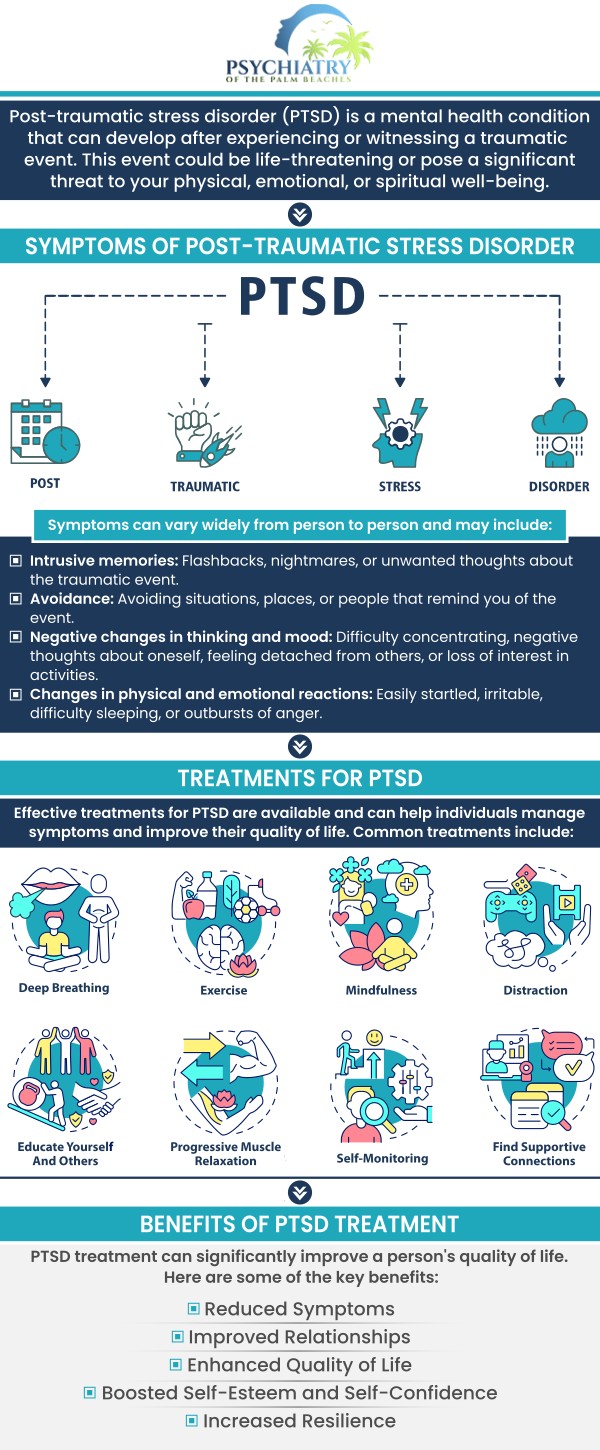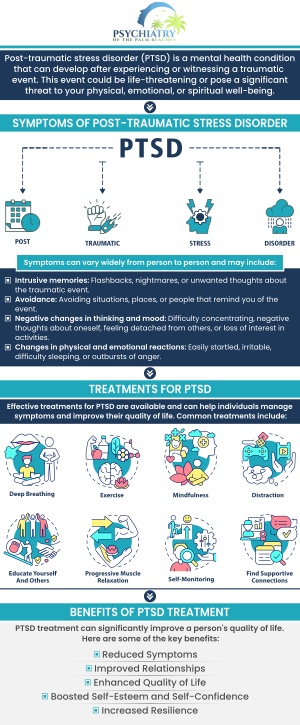How Do You Deal with PTSD?
Post-traumatic stress disorder (PTSD) is a mental illness caused by a stressful incident that causes flashbacks, nightmares, and acute anxiety. Treatment for PTSD can alleviate symptoms by assisting you in dealing with the trauma you’ve encountered. If you or someone you know suffers from PTSD, contact our specialists immediately. At Psychiatry of the Palm Beaches, we can help you address your PTSD in a safe, professional, and empathetic environment. For more information, contact us today or book an appointment online. We have convenient locations to serve you in Jacksonville, Boynton Beach, Palm Beach Gardens, Stuart, Royal Palm Beach, Port St. Lucie, Melbourne, Fort Lauderdale, and Jupiter, FL.




Table of Contents:
How do you deal with PTSD?
What does PTSD do to a person?
What behaviors do people with PTSD have?
What happens when PTSD is triggered?
Post-traumatic stress disorder (PTSD) is a disruptive mental health condition that develops after someone has experienced and/or witnessed a traumatic event. It is typically characterized by symptoms such as nightmares, flashbacks, avoidance behaviors, and intense anxiety or stress – all of which can negatively impact one’s day-to-day life.
The effects of PTSD can be severe and long-lasting, affecting the mental, physical, and emotional health of those who have it. Dealing with PTSD can be challenging, and there is no one-size-fits-all solution for everyone, but effective treatments and self-care strategies can help.
Strategies for dealing with PTSD include:
• Avoiding triggers- Identify and avoid triggers that can trigger the symptoms of PTSD, such as a certain place, person, thing, or event.
• Being patient with yourself- It takes time to heal from PTSD and while recovery may be slow, it is possible. Be patient with yourself and trust the healing process.
• Medication- In some cases, medication may be prescribed to help manage the symptoms associated with PTSD, such as depression, anxiety, and panic attacks.
• Practicing self-care- Self-care activities such as regular exercise, getting adequate rest, eating healthy food, and engaging in stress-reducing activities like meditation, yoga, and deep breathing can help improve mental health.
• Seeking professional help- Consult a mental health professional who specializes in treating PTSD. Therapy can help individuals to overcome their symptoms and understand what is at the root of their distress.
• Utilizing a support system- Establish a support system that includes family, friends, and support groups.
PTSD is a complex disorder that can manifest in many different ways, affecting a person’s behavior, thoughts, and emotions.
PTSD affects how a person socially interacts with others. Feelings of guilt, loneliness, and detachment from family and friends are common with those experiencing PTSD, and they tend to avoid situations and people that might trigger their trauma. This often leads to social isolation as they may struggle to interact and be around their peers, coworkers, and even family members due to trust issues.
PTSD also alters a person’s behavior and mood. Irritability, heightened anxiety, and unpredictable outbursts are all common in individuals struggling with PTSD, and these symptoms often make it difficult for them to maintain healthy relationships or manage life stressors effectively.
Lastly, this condition affects a person’s physical health, bringing about symptoms such as headaches, fatigue, and chronic pain. Those with PTSD are also more prone to experiencing sleep disorders, such as insomnia and sleep apnea, which can often exacerbate their PTSD symptoms.
People with PTSD can exhibit a range of behaviors as a result of experiencing a traumatic event. Some common behaviors associated with PTSD include:
• Avoidance. Individuals may avoid certain people, places, or situations that trigger memories of the traumatic event.
• Difficulty with relationships. PTSD can make it difficult for individuals to form and maintain close relationships.
• Emotional instability. PTSD can cause individuals to experience intense emotions such as anger, guilt, and fear.
• Hypervigilance. People with PTSD may constantly feel on edge or like they are in danger.
• Irritability. Those with PTSD may become easily irritated or angry, especially when faced with reminders of the traumatic event.
• Re-experiencing the trauma. Individuals may experience intrusive thoughts, flashbacks, or nightmares related to the traumatic event.
• Substance abuse. Some individuals may turn to drugs or alcohol as a way to numb their feelings or cope with their symptoms.
It’s important to note that not everyone with PTSD will exhibit all of these behaviors and that the intensity and frequency of these symptoms will often vary from person to person.
When PTSD is triggered, the sufferer may experience a wide range of intense emotions and physical sensations. They may feel like they are reliving the traumatic event, with vivid memories and flashbacks that make it difficult to distinguish between the past and present. They may also feel a sense of intense panic or fear, as though they are currently in danger.
Physical symptoms such as rapid heartbeat, sweating, trembling, and hyperventilation are also very common when PTSD is triggered.
In addition to the emotional and physical effects, the patient may also exhibit certain maladaptive behaviors. For example, they may become agitated, withdrawn, or defensive, or they may engage in avoidance behaviors.
It’s important to note that the duration and intensity of a PTSD attack will vary depending on the individual and the nature of their trauma.
Understanding PTSD Recovery with Our Team at Psychiatry of the Palm Beaches
Dealing with PTSD begins by understanding how trauma affects your thoughts, emotions, and nervous system. Our team helps patients recognize triggers, intrusive memories, and emotional reactions so they can begin the healing process with clarity and support.
If you’re looking for support for your PTSD, please contact us or book an appointment online. Our staff is here to guide you toward a path of healing and improved mental wellness. We serve patients from Boynton Beach FL, Delray Beach FL, Palm Beach Gardens FL, Jupiter FL, Stuart FL, Palm City FL, Royal Palm Beach FL, Wellington FL, Citrus Ridge FL, Jacksonville FL, Riverside FL, Port St. Lucie FL, Beau Rivage West FL, Melbourne FL, Palm Bay FL, Fort Lauderdale FL, Hollywood FL, Jupiter FL, North Palm Beach FL, and surrounding areas.
Check Out Our 5 Star Reviews



Additional Services You May Need
▸ Mental Wellness
▸ Relationship Coaching
▸ Depression and Mood Disorders
▸ Women’s Health
▸ Panic Disorder
▸ Medications Management
▸ Men’s Health
▸ Individual Psychotherapy
▸ Bipolar
▸ ADHD
▸ Geriatric Mental Health
▸ Couple’s Counseling
▸ Obsessive Compulsive Disorder
▸ Social Phobia Treatment
▸ Eating Disorders
▸ Post Traumatic Stress Disorder
▸ Psychotic Disorders


